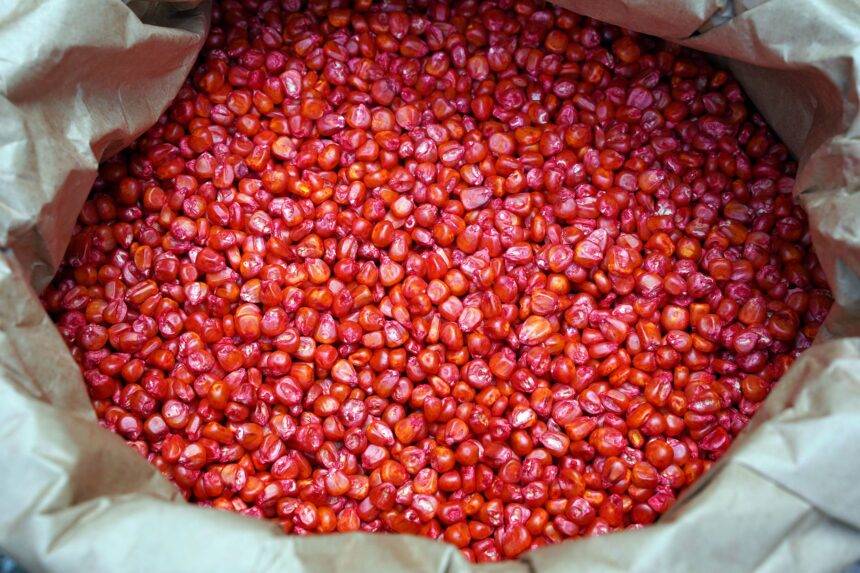Main Points In Hindi (मुख्य बातें – हिंदी में)
-
जलवायु परिवर्तन का प्रभाव: वैश्विक 2024 किसान आवाज सर्वेक्षण से पता चला है कि 75 प्रतिशत किसान जलवायु परिवर्तन के प्रभावों से प्रभावित हैं, जिसमें से 71 प्रतिशत ने कम पैदावार को अपनी प्रमुख चिंता के रूप में बताया है। जलवायु परिवर्तन के कारण मौसम में अस्थिरता, बाढ़, कटाव और जल स्रोतों की कमी जैसी समस्याएँ उत्पन्न हो रही हैं।
-
डिजिटलीकरण का महत्व: लगभग दो तिहाई किसान पहले से ही डिजिटल उपकरणों का उपयोग कर रहे हैं, जिससे वे कृषि निर्णयों को अनुकूलित कर सकते हैं। किसान फसल की पैदावार और गुणवत्ता में सुधार के लिए डिजिटल तकनीकों पर निर्भरता बढ़ा रहे हैं, और 84 प्रतिशत किसान इन तकनीकों को फसल की गुणवत्ता में सुधार के लिए उपयोगी मानते हैं।
-
पुनर्योजी कृषि प्रथाएँ: 90 प्रतिशत से अधिक किसान कम से कम एक पुनर्योजी कृषि पद्धति का उपयोग कर रहे हैं, जिसमें फसल चक्रण और मिट्टी के स्वास्थ्य की निगरानी शामिल हैं। यह प्रथाएँ न केवल मिट्टी की उर्वरता को बढ़ाने के लिए महत्वपूर्ण हैं, बल्कि जलवायु परिवर्तन के प्रभावों से निपटने में भी सहायक हैं।
-
आर्थिक और राजनीतिक चुनौतियाँ: किसानों के सामने सबसे बड़ी चुनौतियाँ मौसम की अस्थिरता, आय की अस्थिरता, और राजनीतिक या नियामक निर्णयों में बदलाव हैं। इस वर्ष, 29 प्रतिशत किसानों ने राजनीतिक और नियामक परिवर्तनों को अपनी शीर्ष चुनौती के रूप में उद्धृत किया है।
- नवाचार और तकनीकी विकास: किसान जलवायु परिवर्तन के प्रभावों से निपटने के लिए नए नवाचार और तकनीकी समाधानों की आवश्यकता महसूस कर रहे हैं। सर्वेक्षण से यह भी स्पष्ट होता है कि किसान भविष्य में अधिक डिजिटल उपकरणों को अपनाने के लिए तत्पर हैं, जिसमें आर्टिफिशियल इंटेलिजेंस (AI) के प्रति जागरूकता बढ़ाने की भी इच्छा शामिल है।
Main Points In English(मुख्य बातें – अंग्रेज़ी में)
Here are the main points from the provided text about the Global 2024 Farmer Voice Survey:
-
Impact of Climate Change: The survey reveals that 75% of farmers are already affected by climate change or are concerned about its impacts, with 71% citing reduced yields as a significant worry. Climate change influences crop yields through various factors like inadequate rainfall, aggressive storms causing floods, and erosion.
-
Economic and Environmental Challenges: Farmers are facing increasing economic and environmental challenges in their essential work of providing food. They seek innovations to adapt to these challenges and desire a supportive environment for implementing regenerative practices that enhance food system resilience and sustainability.
-
Need for Innovation: Approximately 60% of farmers reported experiencing significant revenue losses due to recent abnormal weather events. Consequently, they are looking for innovations to better cope with climate change, focusing on improving yields and protecting livelihoods through more resilient agricultural practices.
-
Digital Technology Adoption: Nearly two-thirds of farmers are already using digital tools to enhance productivity and decision-making in agriculture. The main motivations for adopting digital applications include improving crop yields, reducing costs, and enhancing crop quality, indicating a shift towards incorporating technology in farming.
- Regenerative Agriculture Practices: Over 90% of farmers are using at least one regenerative agricultural practice, which helps enhance soil health and crop productivity. The most commonly implemented practices include crop rotation and maintaining soil fertility through nutrient management, highlighting a growing commitment to sustainable farming methods.


Complete News In Hindi(पूरी खबर – हिंदी में)
वैश्विक 2024 फार्मर वॉयस सर्वेक्षण: जलवायु परिवर्तन, किसानों की चिंताएँ, और नवाचार की संभावनाएँ
जलवायु परिवर्तन का प्रभाव और किसानों की चिंताएँ
वैश्विक 2024 फार्मर वॉयस सर्वेक्षण ने स्पष्ट किया है कि 75 प्रतिशत किसान जलवायु परिवर्तन के प्रभावों से प्रभावित हैं या इसके बारे में चिंतित हैं। इनमें से 71 प्रतिशत ने कम पैदावार को अपनी सबसे बड़ी चिंता के रूप में पहचाना है। जलवायु परिवर्तन फसल उत्पादन पर गहरा प्रभाव डालता है, जैसे कि अपर्याप्त वर्षा, अत्यधिक तूफान, और भूमि का कटाव। इस सर्वेक्षण के नतीजे बताते हैं कि किसान, जो खाद्य सुरक्षा के लिए जिम्मेदार हैं, लगातार आर्थिक और पर्यावरणीय चुनौतियों का सामना कर रहे हैं। बायर के फसल विज्ञान प्रभाग के राष्ट्रपति रोड्रिगो सैंटोस ने कहा कि किसानों को अपने कार्यों में सुधार करने के लिए नवाचारों की आवश्यकता है और उन्हें ऐसे पर्यावरण की आवश्यकता है जो पुनर्योजी प्रथाओं को अपनाने में मदद करे।
सर्वेक्षण के परिणाम


सर्वेक्षण में दुनिया के आठ देश — ऑस्ट्रेलिया, ब्राजील, चीन, जर्मनी, भारत, केन्या, यूक्रेन, और संयुक्त राज्य अमेरिका के 2,000 किसानों से डेटा एकत्र किया गया। पता चला कि 60 प्रतिशत से अधिक किसानों ने हाल ही में असामान्य मौसम की घटनाओं के कारण महत्वपूर्ण आय हानि का अनुभव किया है। अधिकतर किसान जलवायु परिवर्तन के प्रभावों को कम करने के लिए नवाचार को आवश्यक मानते हैं। इस समय, प्रभावशाली बदलावों के लिए सबसे बड़ी आवश्यकताएँ हैं – बेहतर पैदावार, लचीली खेती और स्थायी जीवनशैली।
किसानों की प्रमुख चुनौतियाँ
किसानों ने अपनी प्राथमिक चुनौतियों में मौसम की अस्थिरता (37 प्रतिशत) और मूल्य/आय में भिन्नता (36 प्रतिशत) को शामिल किया। कई किसानों ने यह भी स्पष्ट रूप से उल्लेख किया कि राजनीतिक या नियामक निर्णय उनके काम को प्रभावित कर रहे हैं, जो पहले कभी इस स्तर पर उल्लेखित नहीं हुआ था।
डिजिटलीकरण और नवाचार
किसान अपनी चुनौतियों का समाधान खोजने के लिए डिजिटल तकनीकों का उपयोग कर रहे हैं। लगभग दो तिहाई किसान पहले से ही डिजिटल उपकरणों का उपयोग कर रहे हैं। इसके अतिरिक्त, 25 प्रतिशत किसान भविष्य में भी ऐसे उपकरणों को अपनाने की योजना बना रहे हैं। दुनियाभर में, किसान पूर्वानुमान, निर्णय लेने की प्रक्रिया को अनुकूलित करने और सटीक कृषि कार्यों के लिए डिजिटल उपकरणों का उपयोग कर रहे हैं। आर्थिक फायदे, जैसे फसल की पैदावार में सुधार और लागत बचत, डिजिटलीकरण को बढ़ावा देने वाले प्रमुख कारक हैं।
हालांकि, छोटे किसानों की डिजिटल पहुंच में अंतर है। चीन, केन्या और भारत जैसे देशों में डिजिटल उपकरणों का उपयोग कम है, लेकिन किसान भविष्य में अधिक डिजिटल तकनीकों को अपनाने के लिए उत्सुक हैं।
पुनर्योजी प्रथाओं का महत्व
किसान मिट्टी की सेहत और उत्पादन को बढ़ाने के लिए पुनर्योजी प्रथाओं को लागू कर रहे हैं। सर्वेक्षण में पाया गया कि 90 प्रतिशत किसान अपनी प्रथाओं में कम से कम एक पुनर्योजी कृषि तकनीक का उपयोग कर रहे हैं। हालांकि, औसतन farmer केवल सात प्रमुख पुनर्योजी प्रथाओं का उपयोग कर रहे हैं, जिसमें फसल चक्रण और मिट्टी की उर्वरता बनाए रखना शामिल है।
निष्कर्ष
सर्वेक्षण के परिणाम स्पष्ट करते हैं कि किसान जलवायु परिवर्तन के प्रतिकूल प्रभावों से लड़ने के लिए महत्वपूर्ण तरीके खोज रहे हैं, जबकि नवाचार और डिजिटल तकनीकों के माध्यम से अपनी पैदावार बढ़ाने का प्रयास कर रहे हैं। यह एक महत्वपूर्ण कदम है क्योंकि यह न केवल उनके व्यवसाय को सशक्त बनाता है, बल्कि खाद्य सुरक्षा और पर्यावरण संरक्षण में भी योगदान करता है। कृषि का भविष्य पुनर्योजी प्रथाओं और डिजिटल उपकरणों के एकीकरण से आकार लेगा, जो किसानों के लिए नए अवसरों का निर्माण कर सकता है।
Complete News In English(पूरी खबर – अंग्रेज़ी में)
The Global 2024 Farmer Voice Survey revealed that 75% of farmers are already affected by climate change or are concerned about its impacts, with 71% citing reduced yields as a primary concern. Climate change impacts crop yields through various mechanisms, including reduced rainfall that hinders snowfall and depletes water reserves, aggressive storms that cause flooding, erosion, and chemical runoff.
Rodrigo Santos, president of Bayer’s Crop Science Division, noted that the Farmer Voice Study underscores the economic and environmental challenges that farmers face in their critical role of providing food to the world. Farmers are seeking innovation to help them improve their work and an environment conducive to adopting regenerative practices that enhance food systems’ resilience, benefiting the planet and their livelihoods. The survey was conducted by Kynetec, a global market research firm on behalf of Bayer.
The survey engaged 2,000 farmers from countries including Australia, Brazil, China, Germany, India, Kenya, Ukraine, and the United States. It found that 60% of farmers have already experienced significant revenue losses due to recent weather events outside the norm. As part of the solution, most farmers are looking forward to innovation aimed at better addressing climate change through new technologies. There is a growing interest in farming driven by the desire for improved yields, resilient farms, and secured livelihoods, encouraging the adoption of regenerative and technological approaches.
Farmers’ most prominent current challenges stem from instability and uncertainty. Over the next three years, more than one-third identified weather variability/extreme weather events (37%) and price/income volatility (36%) as among their top three challenges. Although these concerns remained stable compared to findings from 2023, this year’s survey showed a notable increase in farmers pinpointing political or regulatory decisions as a top concern, with 29% citing it as a top-three challenge—double the figure from the previous year.
Infrastructure and labor challenges were also recognized, with farmers indicating that addressing regulatory and policy changes will benefit their fields in the future. A significant portion of farmers also reported an interest in innovation in crop protection (41%) and seeds (36%).
The use of digital technologies to manage various obstacles and enhance productivity in farming is gaining traction. About two-thirds of farmers already utilize digital tools, with another 25% planning to do so in the future. Farmers worldwide are employing digital applications to improve forecasting, optimize agricultural decisions, and facilitate precise applications. The main drivers of digital adoption are economic; 88% see crop yield improvement as a motivating factor, 85% prioritize cost savings, and 84% focus on enhancing crop quality. Ensuring long-term sustainability in agricultural practices also ranks high (79%), demonstrating farmers’ commitment to land management.
However, a clear digital divide exists among countries with a higher proportion of smallholder farmers. On a global scale, an average of 65% of farmers use digital tools, but in regions like China, 49% of farmers, in Kenya, 42%, and in India, only 8% have adopted digital solutions. Nonetheless, farmers in these countries have plans to implement more digital tools in the future (China: 27%, Kenya: 42%, India: 85%). Furthermore, despite limited knowledge of artificial intelligence (AI) applications in agriculture—72% of farmers reported low awareness—62% expressed interest in learning more.
Notably, farmers are adopting regenerative practices to improve soil health and productivity. The motivation to use digital tools reflects the transition towards regenerative agriculture—a goal shared by farmers who view enhancements in soil health as critical for yield improvement and productivity gains. Santos highlighted that meeting the demands of protecting the planet while ensuring food production requires farmers to earn a livelihood through their practices. He emphasized that regenerative agriculture could be part of the solution.
A significant majority of farmers—over 90%—are incorporating at least one regenerative practice in their operations. On average, farmers utilize about seven out of 17 common regenerative practices, indicating that while progress has been made, there is still room for improvement. Widely adopted practices include crop rotation, nutrient management to enhance soil fertility, and monitoring soil health.
In conclusion, the survey highlights the pressing issues faced by farmers regarding climate change, the economic impacts of weather variability, and their need for innovation through digital tools and regenerative practices. Farmers are actively seeking ways to mitigate these challenges while ensuring sustainable food production and improving their livelihoods. The collective efforts of farmers, society, and businesses are essential to foster resilience in agricultural systems and secure food security in light of changing environmental conditions.
Source link




